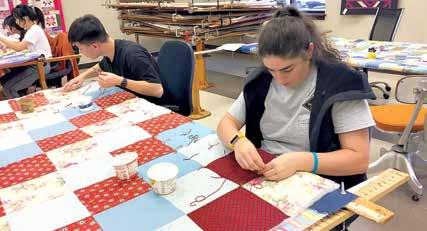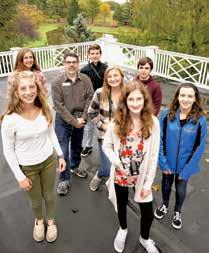
4 minute read
Mini-Term offers academic opportunities beyond the classroom

Dock students in the "Working World of St. Luke's Hospital" Mini-Term class got to experience the working end of an ambulance.
ACADEMICS off the BEATEN PATH
Mini-Term is a new element of the Dock curriculum designed to offer learning opportunities outside the classroom.
Dock’s Senior Experience is a week full of hands-on experiential learning opportunities that are difficult if not impossible to duplicate in the classroom. For many Dock seniors, the week can be transformational, helping to discern college and vocational goals and interests.
Now, Dock is providing similar learning experiences for students in grades 9, 10, and 11. During the 2018-19 school year, Dock held its first-ever “Experiential Day,” offering students a variety of half-day and full-day options for on- and off-campus learning experiences. This year, “Experiential Day” was expanded to a week-long “Mini-Term,” with students pursuing elective learning opportunities in line with their passions and curiosity. These learning opportunities ranged from Russian culture immersion to tours of Philadelphia museums, sustainable agriculture, photography, video production, textiles and fabrics, medical career exploration, and many more (see the list, below).
Career exploration at St. Luke’s
One Mini-Term group spent their week at St. Luke’s Hospital in Quakertown and in the Harmony House dementia care unit at Dock Woods Community. Students appreciated the opportunity to investigate potential career paths in the medical field.
“We had a great experience and I got to witness things that I never thought I would,” said Elyssa Bochnowicz, a junior, of her experience at St. Luke’s. “I got to see more of what happens in an ambulance, and how much work [the EMTs] actually have to do. I realized right away that I want to be involved in that kind of work. It made me feel like I could be part of the hospital staff. Even though they have to work long shifts, it’s worth it because you are working to save lives.”
“The whole experience was amazing, and I especially loved the ambulance station and the clinicals we got to observe,” said junior Samantha Osborn.

EmmaRose Thompson works on her quilt during the “Rag Quilting” Mini-Term class.
Students could choose from a wide variety of Mini-Term options, including:
The Working World of St. Luke's Hospital
Russian Literature and Culture
Things That Fly: Rockets, Drones, RC Airplanes
Golf for Life
Taking Care of Yourself
Makin’ Movies
Adventures in Living Lightly & Learning from the Land
Fishing & Conservation
Discovering Your Family Story
All Things Textiles and Fiber Arts
Mass Incarceration
George Washington Slept Here!
Philadelphia Museums
Film Appreciation, Production, & Storytelling
Extreme Photography
Rag Quilting
Wilderness Expeditions

Students in the “Fishing and Conservation” Mini-Term class pose with their catches after a day of deep sea fishing.
Junior Marciella Shallomita said that her Mini-Term experience confirmed her desire to pursue a career as a heart surgeon. She also enjoyed seeing a practical application of her Dock courses.
“Did you know that ultrasounds are all about physics?” she said. “They measure the speed, direction, and acceleration of blood flow. I’m in AP Physics now, and I am glad to see that it is useful. After the technician learned that I was interested in cardiac surgery, she offered to explain the echocardiogram to me. Then one of her colleagues volunteered to have an echo done on her. That was such a great experience!”
Exploring social issues
Other Mini-Term options helped students explore social issues more deeply, such as mass incarceration. “We made some great connections with community organizations, who loved hosting students—a group that does not typically engage with this topic,” said Dock librarian Laura Martin. Students in her Mini-Term class visited Mennonite Resource Center in Harleysville to assemble prisoner care kits. “That was a highlight for the group,” said Ms. Jordan Kolb, the other faculty advisor for the group. “It was active, tangible, and meaningful for students—a good way to end the week, and a great opportunity for students to experience service.”
“Our visits to the Mennonite Heritage Center and local cemeteries went well,” said Dock faculty member Mr. Dana Gehman, who led a Mini-Term course entitled, "Discovering Your Family Story." Some students were able to make significant progress on creating a family tree, he added.

Haley Harper helps package some greens for market at Second Mountain Farm.
Hands-on learning
The experiential learning that students enjoyed in Mini-Term is an extension of the project-based learning (PBL) that Dock is embracing as a model for its Middle School students (see Learning gets personal, Spring 2019, p. 2). PBL is not a replacement for classroom teaching, but offers enhanced learning opportunities based on the idea that students learn and retain more through hands-on learning in areas they are curious and passionate about, rather than by listening to a lecture or taking a test.
A great example of this is the Mini-Term group, "Adventures in Living Lightly and Learning from the Land," which visited a farm in Virginia where students learned about sustainability and living simply. Students engaged in learning about food processing, meal prep, gardening, and produce packaging, among other topics. “The variety of activities that students were able to participate and stretch themselves in was a definite positive of this trip,” said faculty advisor Ms. Emily Rush. “This was a memorable trip that students will continue to learn from after the experience is over.”

Ainsley Moyer works on her lighting technique during the “Extreme Photography” Mini-Term class.

Students in “Extreme Photography” got some extreme camera angles on the roof of Detweiler House.



